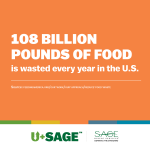Eating Disorders Awareness Week (February 27-March 5) reminds us that although it isn’t easy to talk or think about eating disorders, it’s important. Eating disorders are complex and life-threatening mental illnesses that affect all ages, genders, races, nationalities, sexual orientations, and body shapes and sizes. They exist on a continuum with disordered eating, and symptoms range from extreme restriction to binge eating and distorted body image. The National Eating Disorders Association (NEDA) reports that 30 million Americans will struggle with an eating disorder over the course of their lifetime. And unfortunately, eating disorders are on the rise.
At SAGE, we recognize the risks that exist in our communities. We understand we’re in a unique position because of our daily interactions with students during mealtimes, which is why we have a comprehensive eating disorder prevention and reporting program in place. For more than 10 years, SAGE has partnered with Eating Recovery Center Baltimore to develop training materials for our Team Members. All SAGE employees complete annual training on how to recognize the warning signs that someone might be struggling with an eating disorder. If we notice concerning behaviors from anyone in the community, we work with school administration to connect the individual with the help they need.
We don’t post calories or other nutritional information on our menus. We stopped posting nutritional information in dining halls after learning some community members were struggling because of it. You can review Why SAGE Doesn’t Post Calories in Schools for more detailed information.
Our All Foods Fit philosophy encourages community members to focus on the cultural and social aspects of food, the enjoyment that comes from eating, and the nutrients food provides instead of thinking only about how it may make their bodies look physically. This philosophy encourages a positive relationship with food and honors the many ways food supports overall well-being.
For more information about eating disorders, visit National Eating Disorders Association. If you’re concerned that you or someone you care about might be struggling with an eating disorder, we encourage you to reach out to a healthcare professional and use these resources. Early detection leads to improved treatment results. To reach the NEDA Helpline, call 800.931.2237.








